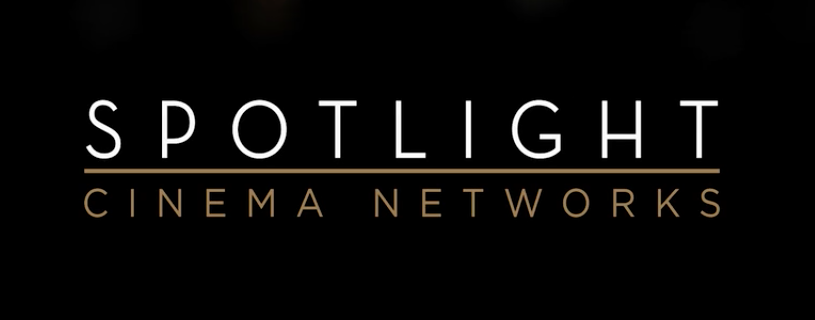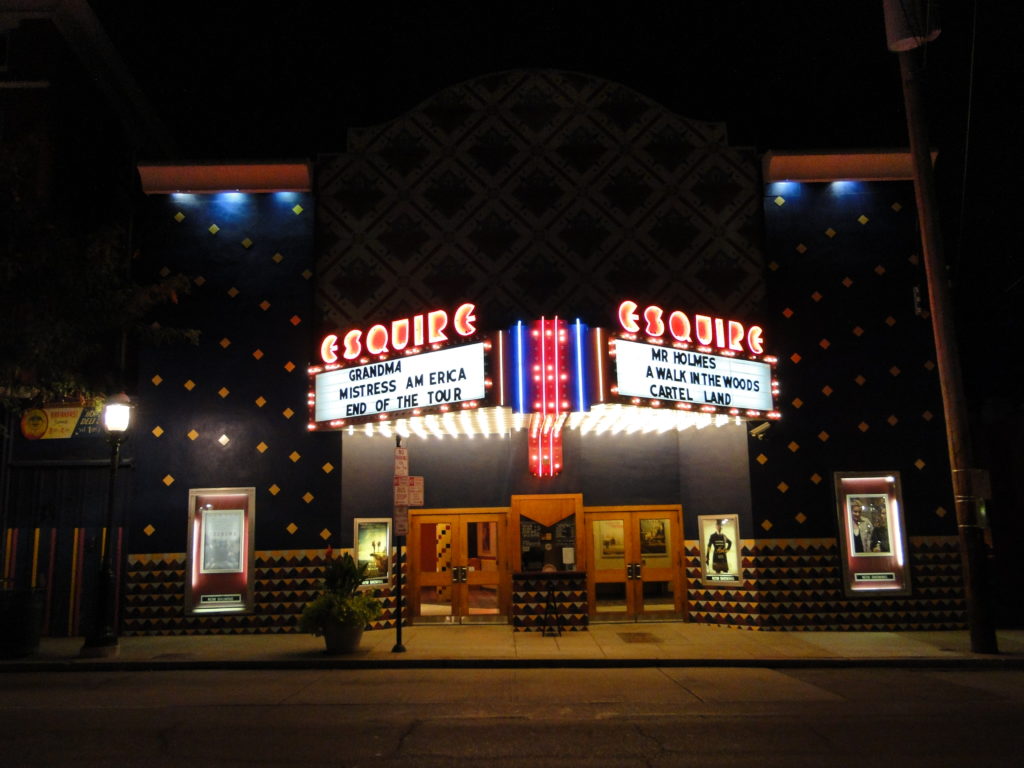As the cinema industry emerges from the Covid-19 pandemic, Boxoffice Pro and Spotlight Cinema Networks are partnering to profile movie theaters and influential industry figures from across the country and ask them to share their first-person accounts of bringing the movies back to the big screen.
Sponsored By:

Esquire Theatre
Cincinnati, Ohio
Interview with Gary Goldman (President) and Julianne Reisenfeld (V.P. of Operations) of Theatre Management Corporation
Can you tell us a bit about the history of the Esquire Theatre?
Reisenfeld: The Esquire Theatre was originally built in 1911 as the Clifton Opera House, a one-screen theater with a small stage showing silent films and featuring live events. In 1915 it became the Clifton Theatre, and in 1927 it began showing movies with sound. On December 24, 1939, the theater was renamed Esquire Theatre.
Goldman: [Theatre Management Corporation’s] entry into the field with the Esquire was back around 1989. The Esquire had recently reopened after a long battle. Wendy’s wanted to come in and put a restaurant on that site. The residents of [the Cincinnati neighborhood of] Clifton fought it all the way up to the Ohio Supreme Court to keep the Wendy’s out. The way they did it was, they created what was called an “environmental quality district,” so any restaurants in the area had to have china and silverware. [Wendy’s] didn’t fit the bill for that. It was certainly a community effort. There were a couple of primary players that would go door to door, knocking for donations for community support to get the Esquire put back together again. … This year will be our 111th anniversary. So since we didn’t get to have our 110th birthday party, because of Covid, we’re going to have our 110th birthday party during year 111.
The Esquire has several different series targeted toward niche audiences, like your anime series and midnight screenings of The Rocky Horror Picture Show and The Room. And your general programming is very diverse, including mainstream films, documentaries, independent films, repertory films, and foreign-language films. How do you find and develop an audience for each of these segments?
Reisenfeld: We try to do a lot of different things throughout the year. We do Noir November with a lot of noir films. We do Spooktober with horror films. We try to do a lot of different things that will engage the community. We have a really strong arts community in Cincinnati. We have the Cincinnati Art Museum, the Taft Museum of Art, the Cincinnati Museum Center, the [University of Cincinnati College’s] Conservatory of Music, the Cincinnati Ballet, and on and on. Partnering with a lot of these people to see what their interests are and what they want to see has definitely been very helpful in arranging the different series that we have. Our longest is definitely The Rocky Horror Picture Show. For 30 years we’ve had it at the Esquire. Every other week we do a midnight showing. There’s a great cast [called] The Denton Affair—they’re local, and they all love to participate.
All of these local art centers, the arts community: What do you do to stay in touch with them and build those relationships?
Reisenfeld: It helps that we’re all local. All of us here are able to join these organizations or have friends in the different organizations, to put the feelers out and see what people are interested in. We are right next to the University of Cincinnati campus, and that has a huge arts community. They have a Film and Media Studies program and the Conservatory of Music. And then they have the [College of] Design, Architecture, Art, and Planning, which is all creative artists. We have a lot of teachers and students who are always coming to us with ‘Hey, what about this?’ or, ‘Oh, I loved this!’ There’s a lot of feedback and suggestions, especially now with social media. It gives us an idea of what they want to see. We’re part of the town hall meetings and things like that, as well. We can see where the pulse is at certain times.
What is the indie film scene like in Cincinnati, and what role does the Esquire play in it?
Reisenfeld: Cincinnati has a strong indie film scene. We work frequently with many local partners, including Film Cincinnati, Cindependent, the Cincinnati Film Society, the Black Cincinnati Cinema Collective, and many local filmmakers. Because we are locally owned and accessible to filmmakers in their own backyard, they utilize the Esquire frequently for showcases, premiere showings, film collaboratives, and student presentations. The Esquire is the go-to cinema to put local films on the big screen, something we are proud and excited to do.

A lot of older theaters have seen substantial shifts in their audience demographics over the decades—the rise of the suburbs causing a lot of downtown theaters to go toward more of a grindhouse direction, for example. During its long history, has the Esquire experienced anything like that?
Goldman: The Esquire as we know it was closed in the ’70s, and ’80s. I can tell you the demographic today is much different than it was in the early ’90s. One thing that is significant is, a lot of people assume that because we’re close to the University of Cincinnati that much of our support came from students. Which it does now, but it wasn’t always that way. It was more the professionals in the area; because of the university, because of the hospitals, a lot of doctors and nurses and health care workers and professors. That was a big chunk of our audience for a long time.
How did you get the student demographic in? That’s something so important, to get those younger generations into the habit of moviegoing.
Reisenfeld: Just being involved. A lot of our employees are from the University of Cincinnati, as well. Being on the ground with them, talking to them, seeing what they’re involved in, reaching out to the sororities, the fraternities, the different groups, the professors. I came from education as well, so that was helpful to know where to navigate to get the interest of the students.
Honestly, a lot of the college students—and a lot of my friends, when I went to school there—didn’t even know about the Esquire. It was a new experience, because it wasn’t the mainstream movie theaters and chains that they were used to. So all of a sudden, it’s a brand-new horizon of all these unique films and different things that they wouldn’t get a chance to see anywhere else.
What has the Covid experience been like for you?
Goldman: The Covid period for us was just like it was for everyone else: It was terrible. We were shut down by government mandate for a period of several months. We tried to survive by selling mega-bags of popcorn from the theater. We tried streaming our own films. We got a lot of community support, but certainly not enough to pay the bills.
What films have done well for you since reopening in July 2020? Spider-Man: No Way Home, I imagine; that did well for everyone.
Reisenfeld: Yeah, the tentpoles always do well. But the interactive programs we do—like Rocky Horror, and we do White Christmas every year, as well—they’ve all had multiple sellout shows. Those interactive, unique programs are definitely ones that do well. We’ve had a few documentaries, like Summer of Soul, about the Harlem Cultural Festival, that did really well. Award-buzz movies: Minari, Nomadland. And local stuff. We did The Boys in Red Hats, about the Covington Catholic kids [whose 2019 interaction with a Native American activist at the Lincoln Memorial’s March for Life led to controversy]. And then the independent directors, like Wes Anderson or Paul Thomas Anderson. Licorice Pizza and The French Dispatch both did really well.
The Esquire is like a cinema with a very strong connection to its audience. How did that play into your choice of in-cinema advertisement providers?
Goldman: When I would go to the big box theaters, I would hate being bombarded with real commercial ads. We worked hard to find Spotlight, because they would provide us with really classy, low-key ads that fit our niche and what we do. We didn’t want the car dealers and the Coca-Cola [ads]. We certainly don’t mind advertising for Ferrari or Porsche. [Spotlight provides] really classy ads, which makes it nice.
Reisenfeld: We set up a lot of our own local advertising with community organizations, locally owned businesses, and companies that are as unique as our films to target our special market. Just like our programming, we have a mix of advertisers (local and national), so there is something for everyone. We have a lot more local inclusion than larger cinema chains, as we can connect with businesses in our own backyard. For national outreach, we have found that our partner (Spotlight Cinema Networks) provides a perfect mix of exactly what we’d like to see in an art house environment for our patrons at the Esquire, as well as [sister cinemas] Mariemont and Kenwood. Patrons that come to see our unique films also like to see unique and special advertising.
Anything else you’d like to mention about the Esquire?
Goldman: Best popcorn in town.
What makes it so good?
Goldman: If you tell me the secret ingredients in Kentucky Fried Chicken, I’ll tell you what we do to the popcorn. [laughs]
The post INDIE FOCUS: Cincinnati, Ohio’s Esquire Theatre appeared first on Boxoffice.
from Boxoffice





0 comments:
Post a Comment